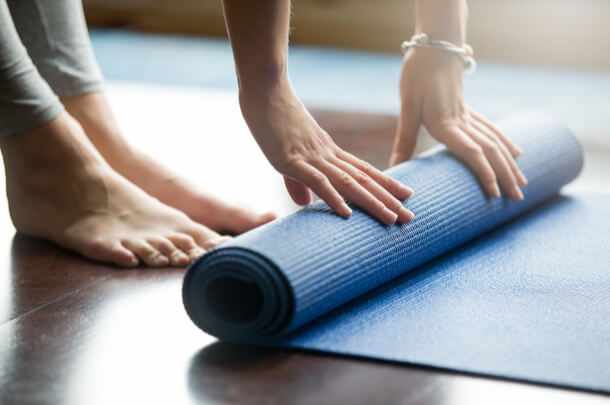Overcoming addiction is largely an internal, mental and emotional process that requires determination, courage and strength. Everyone entering recovery benefits from holistic therapy, such as residential treatment that incorporates yoga therapy for addiction. Using yoga for addiction recovery treatment provides individuals with a consistent opportunity to connect with themselves in a safe and supportive environment. Through the practice of yoga, individuals in recovery can learn to tap into their inner strength and balance, while also developing healthy habits to replace old patterns of behavior. Addiction recovery yoga helps increase self-awareness, reduce stress and improve overall physical health.
How Yoga for Addiction Recovery Works
Using yoga for addiction recovery is an effective and natural way to heal from substance abuse. In this approach, Journey Hillside instructors will patiently guide and encourage patients of all ability and experience levels through yoga poses, meditation and mindfulness training, and breathing exercises to bring awareness to the body, mind and emotions.
The instruction focuses on helping individuals employ yoga for addiction to enhance self-awareness and promote calm. The skills gained from practicing yoga in addiction recovery help individuals who are recovering from addiction manage cravings and withdrawal symptoms, as well as the emotions associated with addiction. With its emphasis on acceptance, patience and kindness, yoga for addiction recovery allows individuals to gain greater insight into their triggers, learn self-regulation techniques, cultivate positive habits and build healthier relationships.
JOURNEY HILLSIDE TARZANA
At Journey Hillside Tarzana, we incorporate yoga into our signature services to teach patients how to access a peaceful inner state in which they can manage the stressors of recovery whenever the need arises.
Through the use of breathing exercises, controlled postures and relaxation techniques, yoga promotes holistic rejuvenation that helps one feel calm and grounded. For individuals struggling with addiction, this creates a sense of balance and regulation they likely haven’t felt in a long time, providing a foundation of strength and resilience on which to build sustainable recovery.
YOGA IN RECOVERY
Addiction recovery isn’t an easy process. Sometimes, it can be difficult to stay focused and remember why you’re here. Staying on track requires large reserves of energy, patience and persistence. When you’re feeling mentally depleted, your resolve may waver and you can lose your commitment to the program. Yoga helps patients to stay focused in recovery and is often seen as the perfect complement to traditional recovery and 12-step programs. When patients are practicing yoga, they’re engaged in a self-care activity that can replenish the strength they need to keep going forward. By taking the time to slow down and process their thoughts, yoga can help patients manage challenging situations and work through difficult emotions.
Patients who practice yoga regularly also learn how to reconnect with themselves. Addiction often makes people feel disconnected from their bodies. As substance use takes over, it becomes more difficult to function without drugs or alcohol and a schism forms between the mind and body. Yoga helps to heal this gap by providing a quiet mental space in which one can reflect and connect with their true self.
During this time, patients are able to listen to their inner voice and what it’s saying. Are you living the life you really want? What brings you joy? Are you surrounded by people who love and support you? Is anything holding you back from achieving happiness and freedom from substance use? It can be challenging to ask these questions, but finding out the answers can clear the way to long-term, sustainable recovery. By focusing on the self, patients can attain a greater degree of self-awareness that helps them rediscover their goals and how to use them to move forward in treatment.
BENEFITS OF YOGA FOR ADDICTION RECOVERY
As a physical and spiritual activity, yoga provides numerous benefits
Yoga promotes flexibility, strength and adaptability, as well as a sense of purpose and balance. These qualities can help patients in recovery manage difficult or unexpected situations and see setbacks or disappointments from a new perspective. Yoga also supports patients throughout treatment by helping them stay focused on their goals while facilitating holistic healing, self-discovery and inner growth. Those who practice yoga are often surprised by the variety of ways in which it improves their mental, physical and spiritual health.
Benefits of yoga
- REDUCE STRESS
- IMPROVE FITNESS
- BALANCE AND FLEXIBILITY
- MENTAL CLARITY
- WELLNESS
- MINDFULNESS TRAINING
- IMPROVED MOOD
- COMPREHENSIVE HEALING
- PEACE OF MIND
- SPIRITUAL GROWTH
MENTAL BENEFITS OF YOGA
Yoga promotes a greater degree of mindfulness and mental well-being by providing the space to reflect and reconnect with the inner self. This awareness helps patients to understand their substance use disorder and the effect it has on the mind and body. The relaxing, stress-reducing aspect of yoga has also been shown to improve the symptoms of mental health disorders such as depression, anxiety and PTSD by increasing levels of the neurotransmitter GABA in the brain. This has proven beneficial for patients in all stages of treatment but is especially helpful for those in detox or early recovery. During this time, traces of drugs or alcohol often linger in the body and may cause mental distress, imbalances or uncomfortable side effects. Incorporating yoga into recovery helps alleviate these symptoms and gives patients the tools they need to move past them.
PHYSICAL BENEFITS OF YOGA
As a low impact exercise, yoga is a great way to re-introduce patients to healthy physical activity. Yoga can be adapted for patients regardless of their fitness level to ensure that they feel at ease and comfortable with the experience. As patients become stronger and more confident, our experienced instructors can introduce advanced poses and techniques. The goal is to make yoga a part of each patient’s daily or weekly routine and provide a moderate challenge that encourages growth. When practiced regularly, yoga has been shown to significantly reduce stress, lower inflammation, reduce chronic pain or discomfort, increase strength and enhance flexibility. Yoga can also improve one’s posture, balance and sleep quality. The overall effect is to teach patients in recovery to listen to their bodies and rediscover healthy movement and activities.
SPIRITUAL BENEFITS OF YOGA
At its core, yoga is a spiritual practice that emphasizes the unity of the mind, body and spirit. Yoga promotes improved self-awareness, inner peace and a connection to the divine. What this means is different for every individual — yoga is not a religion and has flourished across cultures, countries and beliefs. Yoga is simply a way for people to look inward and become aware of themselves on a deeper level. This awareness is often transformative, allowing patients to find meaning, purpose and harmony. When we explore our inner selves, patients can analyze the things they value most and what they hope to get out of the recovery experience.
Is Yoga Good for Recovering Alcoholics?
Alcoholism and yoga may seem like an unlikely combination, however yoga is an excellent tool for recovering alcoholics. During the alcohol addiction treatment and recovery process, it can provide a powerful complement to traditional therapies like cognitive behavioral therapy and the 12 step method. Learning and practicing yoga in addiction recovery is an excellent form of physical activity that can help recovering alcoholics stay healthy and active during their sobriety journey. Not only does it reduce stress and anxiety levels, it encourages mindfulness and calm by helping individuals focus on their breath and body movements. The combination of physical and emotional strength of learning to sustain calmness help carry individuals into long term recovery.
Types of Yoga Practices for Addiction Recovery
Kundalini Yoga
Kundalini yoga is a special type of yoga that focuses on awakening the energy at the base of the spine through breath work, chanting mantras, meditation, postures, and other techniques. The goal is to send energy up the spine, awakening chakras and your divine energy. It is known for its powerful benefits including increased awareness, energy, mental clarity, physical strength and emotional balance.
Hatha Yoga
Hatha Yoga is a traditional form of yoga that combines physical postures (asanas), breathing exercises (pranayama), and meditation, offering practitioners an opportunity to achieve physical, mental, and spiritual balance.
Vinyasa Yoga
Vinyasa yoga is a dynamic and creative form of yoga that focuses on conscious breathing, flowing movements, and mindful transitions between postures to create an energizing and meditative practice.
Yin Yoga
Yin Yoga uses a slower pace, gentle stretching, and static postures to cultivate greater self-awareness, stimulate energy flow throughout the body, and promote physical and mental relaxation.
Bikram Yoga
Bikram yoga consists of a series of 26 postures and two breathing exercises that are performed in a heated room. It is designed to help practitioners develop strength, flexibility, balance and focus while detoxifying the body through sweating.
SPECIALTY HOLISTIC TRACK AT JOURNEY HILLSIDE TARZANA
Yoga is often seen as the perfect complement to traditional addiction recovery. To provide our patients with the most effective treatment modalities and strategies for healing, yoga is integrated into our signature residential services as well as our holistic specialty program. The Holistic Track at Journey Hillside Tarzana incorporates Eastern approaches to recovery, providing patients with alternative therapies and more advanced yoga, mindfulness and meditation techniques.
The goal is to provide comprehensive healing that encompasses a patient’s entire being by focusing on how mental, spiritual and physical wellness are related. Guided by the concept of self-knowledge and self-awareness, patients will delve into the roots of their addiction and learn how to process their thoughts, ideas and emotions productively. The holistic treatments we offer are used in conjunction with traditional modalities.
Holistic treatments we offer
- BLENDING OF EAST-WEST PHILOSOPHIES
- YOGA
- MEDITATION
- MINDFULNESS TRAINING
- HIGHER DEGREES OF INDIVIDUAL THERAPY
- COMMUNICATION SKILLS
- NATURE THERAPY
- NUTRITIONAL SUPPORT
ADDICTION AFFECTS MUCH MORE THAN JUST THE BODY
We understand that addiction affects much more than just the body, so our holistic treatments are designed to address the mental, emotional and spiritual dimensions of an individual. Patients in the Holistic Track will become mindful of themselves, their motivations and their desires so they can begin to move past their addiction.
CONTACT JOURNEY HILLSIDE TARZANA
Yoga is much more than simple stretches and poses. Yoga is a holistic, supplemental treatment that has been shown to help patients in recovery achieve higher degrees of self-awareness and be present in the moment.
If you or someone you care about is struggling with drugs or alcohol, our passionate team of clinicians and specialists can develop an individualized treatment plan that addresses the totality of your substance use disorder. Contact or call us today at 877-414-1024 to learn more about our programs and how they can help.
Tour Our Facility
Is Yoga Therapy for Addiction Treatment Covered by Insurance?
Many health insurance plans cover yoga therapy specifically for addiction treatment. It is important to check with your insurance provider before beginning any kind of substance abuse treatment program. The staff at Journey Hillside is here to help you understand your benefits and to work with you to get the addiction treatment you need. Get in touch today.



